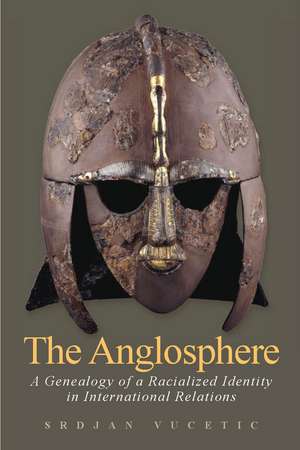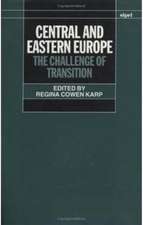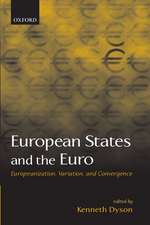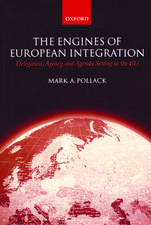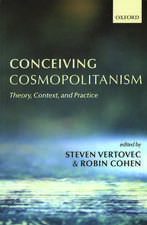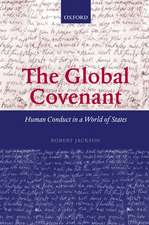The Anglosphere: A Genealogy of a Racialized Identity in International Relations
Autor Srdjan Vuceticen Limba Engleză Paperback – 27 feb 2011
The Anglosphere refers to a community of English-speaking states, nations, and societies centered on Australia, Canada, New Zealand, the United Kingdom, and the United States, which has profoundly influenced the direction of world history and fascinated countless observers.
This book argues that the origins of the Anglosphere are racial. Drawing on theories of collective identity-formation and framing, the book develops a new framework for analyzing foreign policy, which it then evaluates in case studies related to fin-de-siècle imperialism (1894-1903), the ill-fated Pacific Pact (1950-1), the Suez crisis (1956), the Vietnam escalation (1964-5), and the run-up to the Iraq war (2002-3). Each case study highlights the contestations over state and empire, race and nation, and liberal internationalism and anti-Americanism, taking into consideration how they shaped international conflict and cooperation. In reconstructing the history of the Anglosphere, the book engages directly with the most recent debates in international relations scholarship and American foreign policy
This book argues that the origins of the Anglosphere are racial. Drawing on theories of collective identity-formation and framing, the book develops a new framework for analyzing foreign policy, which it then evaluates in case studies related to fin-de-siècle imperialism (1894-1903), the ill-fated Pacific Pact (1950-1), the Suez crisis (1956), the Vietnam escalation (1964-5), and the run-up to the Iraq war (2002-3). Each case study highlights the contestations over state and empire, race and nation, and liberal internationalism and anti-Americanism, taking into consideration how they shaped international conflict and cooperation. In reconstructing the history of the Anglosphere, the book engages directly with the most recent debates in international relations scholarship and American foreign policy
| Toate formatele și edițiile | Preț | Express |
|---|---|---|
| Paperback (1) | 172.04 lei 22-36 zile | |
| Stanford University Press – 27 feb 2011 | 172.04 lei 22-36 zile | |
| Hardback (1) | 645.98 lei 43-57 zile | |
| Stanford University Press – 27 feb 2011 | 645.98 lei 43-57 zile |
Preț: 172.04 lei
Nou
Puncte Express: 258
Preț estimativ în valută:
32.92€ • 34.46$ • 27.24£
32.92€ • 34.46$ • 27.24£
Carte disponibilă
Livrare economică 17-31 martie
Preluare comenzi: 021 569.72.76
Specificații
ISBN-13: 9780804772259
ISBN-10: 0804772258
Pagini: 272
Dimensiuni: 152 x 229 x 18 mm
Greutate: 0.38 kg
Ediția:New.
Editura: Stanford University Press
Colecția Stanford University Press
ISBN-10: 0804772258
Pagini: 272
Dimensiuni: 152 x 229 x 18 mm
Greutate: 0.38 kg
Ediția:New.
Editura: Stanford University Press
Colecția Stanford University Press
Recenzii
"The Anglosphere brings the study of international relations into the twenty-first century, paradoxically, by returning to the past. Vucetic analyzes the now officially forgotten racial-in-origin identification of Anglo-Saxon peoples and shows how it still matters in the close alignment of policies among the US, Great Britain, Canada, Australia, and New Zealand. He wants us all to think harder about racialization as a force in world politics."—Robert Vitalis, University of Pennsylvania
"Relying on the toolkit of social science and informed by a sure grasp of international relations theory, this audaciously brilliant book inquires into the racial and post-racial foundations of the liberal core of the international system. My recommendation is simple. Read it, admire it, and learn from it."—Peter J. Katzenstein, Walter S. Carpenter Professor, Jr. of International Studies, Cornell University
"International relations theory remains remarkably resilient in its refusal to accord race a fundamental place in its vocabulary or explanations. By concentrating on the 'Anglosphere' core, Vucetic's engaging analysis of the evolving special relationship between the United States and the British Empire promises to destabilize such complacency by demonstrating ways in which their foreign policies are premised on a shared—often explicit—white identity. Realists and liberals should take note, but so too should any constructivists who have dismissed critical variants of post-positivism."—Audie Klotz, Maxwell School of Citizenship and Public Affairs, Syracuse University
"Judiciously balancing theory and history, Srdjan Vucetic shows what difference the 'Anglosphere'—that unique identity that binds the English-speaking world—made to how its members pursued their interests abroad. From its racialized Anglo-Saxon origins to its contemporary intertwining with liberal internationalism and human rights, the Anglosphere has proven resilient in global politics, and Vucetic demonstrates how this changing discourse has shaped these nations' debates over foreign affairs. Building on previous work on language and international relations, Vucetic's story is rich yet readable, his method rigorous, his style engaging. A real contribution to our understanding both of how language shapes global politics and of how the Anglo-American world came to be."—Ronald R. Krebs, University of Minnesota
"Srdjan Vucetic has crafted an outstanding analysis of the role of racial factors—in this case Anglo-Saxonism—in international politics. The study is genuinely ground-breaking in this regard. It is also theoretically, methodologically and empirically sound. Indeed, I believe it offers a master-class in how to deploy scholarly techniques. The range of case studies to which he applies his argument is truly impressive. I am in no doubt that this book will inspire colleagues in international relations and political science to think again about their disciplines' neglect of this vital subject."—Inderjeet Parmar, University of Manchester
Notă biografică
Srdjan Vucetic is Assistant Professor at the Graduate School of Public and International Affairs, University of Ottawa. He teaches international relations theory and American foreign policy.
Descriere
Anchored in contemporary debates over identity politics in the study of international relations, this book reconsiders the origins of the United State's "special relationships" with Australia, Britain, Canada and New Zealand.
